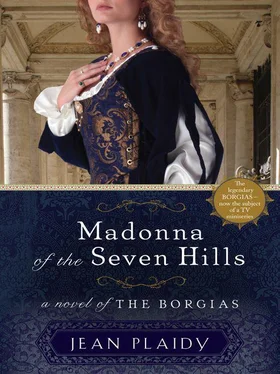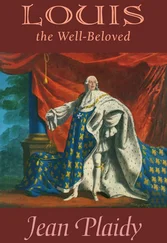Виктория Холт - Madonna of the Seven Hills
Здесь есть возможность читать онлайн «Виктория Холт - Madonna of the Seven Hills» весь текст электронной книги совершенно бесплатно (целиком полную версию без сокращений). В некоторых случаях можно слушать аудио, скачать через торрент в формате fb2 и присутствует краткое содержание. Жанр: Исторические любовные романы, на английском языке. Описание произведения, (предисловие) а так же отзывы посетителей доступны на портале библиотеки ЛибКат.
- Название:Madonna of the Seven Hills
- Автор:
- Жанр:
- Год:неизвестен
- ISBN:нет данных
- Рейтинг книги:4 / 5. Голосов: 1
-
Избранное:Добавить в избранное
- Отзывы:
-
Ваша оценка:
- 80
- 1
- 2
- 3
- 4
- 5
Madonna of the Seven Hills: краткое содержание, описание и аннотация
Предлагаем к чтению аннотацию, описание, краткое содержание или предисловие (зависит от того, что написал сам автор книги «Madonna of the Seven Hills»). Если вы не нашли необходимую информацию о книге — напишите в комментариях, мы постараемся отыскать её.
Madonna of the Seven Hills — читать онлайн бесплатно полную книгу (весь текст) целиком
Ниже представлен текст книги, разбитый по страницам. Система сохранения места последней прочитанной страницы, позволяет с удобством читать онлайн бесплатно книгу «Madonna of the Seven Hills», без необходимости каждый раз заново искать на чём Вы остановились. Поставьте закладку, и сможете в любой момент перейти на страницу, на которой закончили чтение.
Интервал:
Закладка:
They grew listless, both of them. The weather was sultry and it was said that there was pestilence in the air. Giorgio grew paler and thinner each day until he took to his bed and there was quiet throughout the house.
Vannozza wept bitterly, for she had come to love her meek husband, and when he died she was very sad. It was not long afterward that little Ottaviano, suffering in the same way as his father had, took to his bed and died. Thus in a few months the household had lost two of its members.
Lucrezia wept to see her mother unhappy. She missed little Ottaviano too; he had been one of her most faithful admirers.
Cesare found her crying and wanted to know why.
“But you know,” she said, her light eyes wide and wondering. “Our father is dead and our little brother with him. Our mother is sad and so am I.”
Cesare snapped his fingers angrily. “You should not weep for them,” he said. “They are nothing to us.”
Lucrezia shook her head and for once she would not agree with him. She had loved them both; she found it easy to love people. Giorgio had been so kind to her, Ottaviano had been her dear little brother, so she would insist on weeping even though Cesare forbade her.
But Cesare must not be crossed. She saw the dark angry look come into his eyes.
“Lucrezia, you shall not cry for them,” he insisted. “You shall not, I say. Dry your eyes. Look here is a kerchief. Dry them and smile. Smile!”
But it was not possible to smile with all her grief upon her. Lucrezia tried, but she remembered the kindness of Giorgio and how he had carried her on his shoulder and looked so pleased when people had admired her yellow hair; she remembered how little Ottaviano had a habit of creeping close to her and slipping his little hand in hers; she remembered how he used to lisp her name. She could not smile, because she could not forget that she would never see Giorgio and Ottaviano again.
Cesare seemed as though he were finding it difficult to breathe, which meant he was very angry. He took her by the neck, and this time there was more anger than tenderness in the gesture.
“It is time you knew the truth,” he said. “Have you not guessed who our father is?”
She had not thought of possessing a father until Giorgio came into the house, and then, as Vannozza called him husband, she had thought of him as father, but she knew better than to say that Giorgio was their father; so she was silent, hoping Cesare would relax his hold on her neck and let the tenderness return to his fingers.
Cesare had put his face close to hers; he whispered: “Roderigo, Cardinal Borgia, is not our uncle, foolish child; he is our father.”
“Uncle Roderigo?” she said slowly.
“Of a certainty, foolish one.” Now his grip was tender. He laid his lips on her cool cheek and gave her one of those long kisses which disturbed her. “Why should he come here so often, do you think? Why should he love us so? Because he is our father. It is time you knew. Now you will see that it is unworthy to cry for such as Giorgio and Ottaviano. Do you see that now, Lucrezia?”
His eyes were dark again—not with rage perhaps, but with pride because Uncle Roderigo was their father and he was a great Cardinal who, they must pray each day, each night, might one day be Pope and the most powerful man in Rome.
“Yes, Cesare,” she said, for she was afraid of Cesare when he looked like that.
But when she was alone she went into a corner and continued to weep for Giorgio and Ottaviano.
But even Cesarewas to discover that the death of those whom he had considered insignificant could make a great difference to his life.
Roderigo, still solicitous for the welfare of his ex-mistress, decided that, since she had lost her husband, she must be provided with another; therefore he arranged a marriage for her with a certain Carlo Canale. This was a good match for Vannozza since Carlo was the chamberlain of Cardinal Francesco Gonzaga, and a man of some culture; he had encouraged the poet, Angelo Poliziano, in the writing of Orfeo , and had worked with distinction among the humanists of Mantua. Here was a man who could be useful to Roderigo; and Canale was wise enough to know that through Roderigo he might acquire the riches he had so far failed to accumulate.
Roderigo’s notary drew up the marriage contracts and Vannozza prepared to settle down with her new husband.
But as she had gained a husband she was to lose her three eldest children. She accepted this state of affairs philosophically for she knew that Roderigo could not allow their children to remain in her house beyond their childhood; the comparatively humble home of a Roman matron was not the right setting for those who had a brilliant destiny before them.
Thus came the greatest change of all into Lucrezia’s life.
Giovanni was to go to Spain, where he would join his eldest brother, Pedro Luis, and where his father would arrange for honors to fall to him; and those honors should be as great as those which he had given to Pedro Luis. Cesare was to stay in Rome. Later he was to train for a Spanish Bishopric, and to do this he must study canon law at the universities of Perugia and Pisa. For the time being he was with Lucrezia but they were soon to leave their mother’s house for that of a kinswoman of their father’s; therein they would be brought up as fitted their father’s children.
It was a staggering blow to Lucrezia. All that had been home to her for six years would be home no longer. The blow was swift and sudden. The only one who rejoiced in that household on the Piazza Pizzo di Merlo was Giovanni, who strutted about the nursery, wielding an imaginary sword, bowing in mock reverence before Cesare whom he called my lord Bishop. Giovanni, intoxicated with excitement, talked continually of Spain.
Lucrezia watched Cesare, his arms folded across his breast, his face white with suppressed anger. Cesare did not rage, did not cry out that he would kill Giovanni; for once Cesare was beaten.
The first important change of their lives had been reached and they all had to accept the fact that however much they might boast in the nursery, they had no alternative but to obey orders.
Only once, when he was alone with Lucrezia, did Cesare cry out as he thumped his fist on his thighs so violently that Lucrezia was sure he was hurting himself: “Why should he go to Spain? Why should I have to go into the Church? I want to go to Spain. I want to be a Duke and a soldier. Do you think I am not more fitted to conquer and rule than he is? It is because our father loves him better than he loves me that Giovanni has cajoled him into this. I will not endure it. I will not.”
Then he took Lucrezia by the shoulders, and his blazing eyes frightened her.
“I swear to you, little sister, that I shall not rest until I am free … free of my father’s will … free of the will of any who seek to restrain me.”
Lucrezia could only murmur: “You will be free, Cesare. You will always do what you want.”
Then he laughed suddenly and gave her one of those fierce embraces which she knew so well.
She was anxious about Cesare, and that meant that she did not worry so much about her own future as she might otherwise have done.
MONTE GIORDANO
A driana of the house of Mila was a very ambitiouswoman. Her father, a nephew of Calixtus III, had come to Italy when his uncle became Pope, because it seemed that under such benign and powerful influence there might be a great future for him. Adriana was therefore related to Roderigo Borgia, who held her in great esteem, for she was a woman not only of beauty but of intelligence. It was owing to these qualities that she had married Ludovico of the noble house of Orsini, and the Orsini was one of the most powerful families in Italy. Adriana had a son who had been named Orsino; this boy was sickly and, having a squint, rather unprepossessing, but on account of his position—as the heir to great wealth—Adriana hoped to make a brilliant marriage for him.
Читать дальшеИнтервал:
Закладка:
Похожие книги на «Madonna of the Seven Hills»
Представляем Вашему вниманию похожие книги на «Madonna of the Seven Hills» списком для выбора. Мы отобрали схожую по названию и смыслу литературу в надежде предоставить читателям больше вариантов отыскать новые, интересные, ещё непрочитанные произведения.
Обсуждение, отзывы о книге «Madonna of the Seven Hills» и просто собственные мнения читателей. Оставьте ваши комментарии, напишите, что Вы думаете о произведении, его смысле или главных героях. Укажите что конкретно понравилось, а что нет, и почему Вы так считаете.











